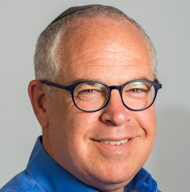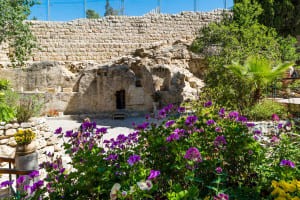A war, a vacation and a teachable moment
Author reflects on the Second Lebanon War in 2006

It was the end of the summer of 2006, and my wife and I had a plans for a much-needed family vacation. Within several weeks of each other that year, each of our mothers died, necessitating multiple trips back-and-forth to the United States from Israel for their funerals, to begin to sort out their respective estates, and overall grief.
It was also the end of the summer during which Israel suffered one of its longest wars, the Second Lebanon War, with thousands of rockets fired at Israeli communities, hundreds of Israelis killed and injured, and over a million Israelis fleeing the north for the safety of central and southern Israel.
While we were not in range from the Lebanese terrorist rockets at that time, the tension was thick during the month-long fighting.
Our planned vacation was to the Galilee, which is full of religious significance, biblical history, along with a wide variety of things to do as a family of eight including children ranging from one to 13. Rumors of cease fires and the war ending were reported for days. Eventually there was a cease-fire and Israel began to creep back to normal.
Until the last minute, we were not sure civilians would be allowed to go to northern Israel in what was a war zone days earlier. The seaside hotel in which we had reservations was being used as a respite for soldiers getting short breaks from the battle. Just days before we were scheduled to go away, we still didn’t know if it would be allowed. Thankfully we went.
Our children knew that there had been a war, many deaths and injuries, but were not aware of details, nor did we go out of the way point out the scorched fields, destroyed buildings, and shrapnel marked structures indicating that rockets designed to cause as much death and injury as possible had been landing there as recently as the week before.
Overall, we had a great time and began to put our own lives back in perspective, absorbing as a family the impact of our respective mothers’ death in the wake of a war. I thought how even though my mother knew we lived out of range that it was a “good” thing, that she was not alive to witness this from a distance was also good because it would’ve upset her that we were living anywhere close to being at risk.
Early one morning, on one of the last days of our vacation, I drove out to a local grocery store and filled up the back of our van with as much drinks as possible. It was important to support the local businesses, but I had another plan that would be the highlight of our vacation.
I drove back to the hotel and loaded up my family. In no time we were off, turning right and heading north. The scenery leaving the western coast of the Sea of Galilee driving north is mountainous as you ascend from hundreds of feet below sea level to hundreds of feet above. There is volcanic rock scattered along with hills indicating ancient volcanic activity.
We traveled north, and without my saying a word my kids became intuitive to the fact that we were heading toward the Lebanese border. This resulted in protests of concern and even fear, even though they knew the war was over. Being in the driver’s seat, I did not detour from the route or my plans. At one point I made a left turn onto what would be generously called a dirt road, following my instinct as to where the border with Lebanon is. By then, my kids were even more nervous.
I drove slowly along the unpaved road so as not to bottom out with the unusually heavy vehicle filled with eight people and dozens of bottles of soft drinks. At one point, out of the blue, or rather out of the green, two soldiers appeared. They had been sitting behind a bush guarding this access road toward the border. They stopped me and said that we were not allowed to continue further. I responded to them that we just brought them cold drinks. I’ll never forget how that lit up their faces as they expressed profound gratitude.
I had way too much just for two soldiers, but they would not permit me to drive further to bring it to the larger group of soldiers stationed further ahead. They said we could unload everything, and they would make sure that all the soldiers nearby would receive the drinks. A minute later my kids were unbuckled, in the dirt, enthusiastically giving out bottles of drinks to these two young men who are the immediate beneficiary of this simple act of kindness.
To show their appreciation, the soldiers scavenged in the road’s dusty surface and began picking up souvenirs for my children as gifts: used bullet casings. My kids thought it was cool, and appreciated that they made the soldiers happy. I realized that with as many bullet casings on the ground as there were, a week earlier we would have literally been in the midst of combat.
I was able to turn the car around on the narrow dirt road and we were off, almost as quickly as we arrived. The mood in the car was the polar opposite of the anxiety that they felt as we drove in. Now my kids were feeling happy and satisfied.
By the time I made it back to the main road, I had already begun explaining that this is what we do in Israel to support our soldiers, and that certainly when my oldest son (who was then 7) was in the army, they would also go out of their way to bring him things to show appreciation and make them feel good.
It was arguably the scariest yet most successful learning moment of my parenting, at least to that point.
Now, 16 years later, my oldest son has completed his military service and my youngest son has just been called up to do his. As I taught them, indeed there were multiple times when we, and my other children alone, would drive hours in order to bring our son treats. I lost count how many times. We always brought more than enough so that he could share with his fellow soldiers.
Since then, we have also adopted a family custom to bring cold drinks in the summer and hot soup in the winter to soldier stationed near our home, keeping us safe. They are not our children biologically, but there is a sense that they are all our children. We are accountable to them as we would want others to be for our children guarding near their communities in other parts of the country. Indeed, my son shared that happened frequently, receiving kind hospitality of complete strangers.
Building bridges between Jews and Christians through the Genesis 123 Foundation in a way that is deeply personal, I have had the privilege of undertaking this project for a few years to enable many others to participate, if only by donating a few dollars to buy a six pack of cold drinks, or pay for the groceries that go into making a huge pot of soup. This is the second summer of our tradition to bring cold watermelon to soldiers as well, loading up the trunk of my car with over 100 kg of cold watermelon at a time, and receiving back 1000 smiles in return. The appreciation for one thick slice of cold sweet watermelon, and a large bottle of something cold to drink, is, as the TV commercial goes, priceless.
Israel just completed another counterterrorism operation in Gaza. While the rockets have stopped being fired for now, the tension is as high as the summer is hot. This week, the anniversary of the end of the Second Lebanon war, there was another terrorist shooting in Jerusalem leaving eight injured when a gunman open fire on a packed public bus.
Whether on the city streets, dirt roads, or intersections around highly populated areas near Palestinians where the risk of terror is real, it is important to show our appreciation even from afar for the soldiers guarding and keeping us safe, sometimes standing alone in the heat of the sun wearing equipment that weighs them down and makes the more uncomfortable.

Jonathan Feldstein was born and educated in the U.S. and immigrated to Israel in 2004. He is married and the father of six. Throughout his life and career, he has become a respected bridge between Jews and Christians and serves as president of the Genesis 123 Foundation. He writes regularly on major Christian websites about Israel and shares experiences of living as an Orthodox Jew in Israel. He is host of the popular Inspiration from Zion podcast. He can be reached at [email protected].














